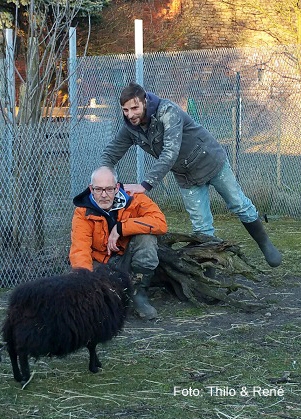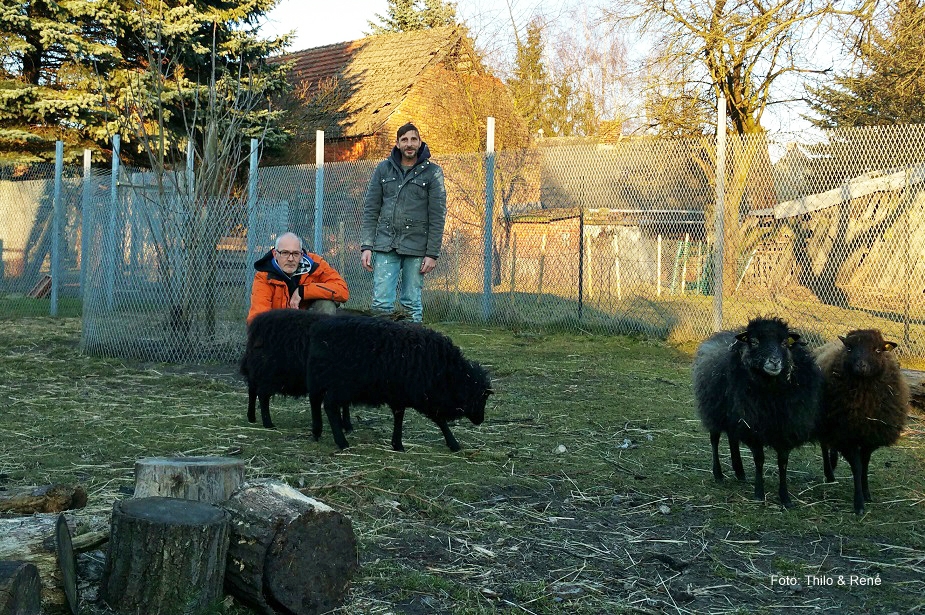Manuel lives in the country and wants to move to the big city. The exact opposite way is Thilo gone. Born in Berlin, he lives with his husband Renéfour dwarf sheep and 45 rare chickens in a village between Neuruppin and Havelberg. Happy.
Born in Berlin, not far from Bahnhof Zoo, Ku'damm and the Gedächtniskirche, Thilo already longed for the forest, his own garden and birds as a child. In his early 30s, the time had come: the Berliner bought a house in the suburbs. "However, it took me a second attempt to find the right neighbourhood," admits the now 51-year-old. In the neighbourhood, he was so much criticised as a "Wessi" that he sold the house again. Instead of fleeing back to the metropolis, Thilo bought a farmhouse even deeper in Brandenburg in 1998. It is located in Sieversdorf, a village with 600 inhabitants in the Ostprignitz region.
"The sympathy is much greater in the countryside"
Move to the no-go area
Brandenburg of all places. Some According to estimates homophobic acts of violence and insults occur four times more frequently here than in Berlin. The man with whom Thilo fell in love in 2006, whom he persuaded to live together in Sieversdorf and whom he married in 2009, was correspondingly sceptical at first: René comes from the Black Forest and is quite used to homophobic prejudice. The move to Sieversdorf was full of fear. "2006 was the year of the World Cup, and German politicians proclaimed Brandenburg a no-go area," René recalls.
Working together counts
But when the furniture van pulled up in front of the farmhouse, everything turned out differently. The first comment René heard from a passer-by was: "Oh look, that's the new one from Thilo. He's staying longer." Since then, there has not been a single situation in which the two have felt marginalised in Sieversdorf. In the

On the contrary: people came to the church for the wedding ceremony who, according to the priest, don't even show up at Christmas. "In the countryside, people are much more involved in the lives of their fellow human beings than in the city," says Thilo. "In my experience, people here don't expect you to agree with them on everything. But they do demand sincerity."
Thilo and René see this sincerity as the reason why they are amicably known as "the boys" in Sieversdorf. They live their love for each other openly, a rainbow flag flies in front of the house and the two have even made no secret of their HIV infection. The reaction of a neighbour: "Well, one has cancer, another has HIV, that's just the way it is." That was the end of the matter in the village.
"The boys" have work to do
Because of their infection, René and Thilo have been early retirees for years. But they still have work to do. Thilo works part-time in dementia flats in Spandau, René a few days a month in a Berlin gay sauna. At home, they look after animals - and that doesn't just mean "an ancient, slightly demented cat" and two mandarin ducks. On a tour of the courtyard and garden, the couple proudly show off their chicken aviaries. They are home to 45 birds of endangered breeds, each of which looks funnier than the next. The four sheep plucking at the grass are also a rarity. They are Ouessant sheep. The woolly dwarves don't even reach the tall Thilo's knee and yet they are already fully grown.
And then there are the weekend visitors. The couple's friends call the house, which is just a few hundred metres from the forest, an "oasis of well-being" and enjoy sitting in front of the fireplace with their hosts. Do René and Thilo miss something in the country? The two think for a moment. "The distances to the shops are shorter in the city," replies René. Thilo nods.










